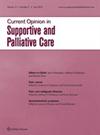IF 2
4区 医学
Q3 HEALTH CARE SCIENCES & SERVICES
Current Opinion in Supportive and Palliative Care
Pub Date : 2019-12-01
DOI:10.1097/SPC.0000000000000464
引用次数: 12
摘要
癌症恶病质不能通过标准的营养支持轻易逆转,可能需要针对潜在代谢紊乱的干预措施来预防或逆转恶病质并维持健康的身体成分。以下综述将重点介绍癌症患者胰岛素抵抗、生长素信号改变和性腺功能减退的贡献和潜在的治疗干预措施。除了热量摄入减少、慢性炎症、葡萄糖、蛋白质和脂质代谢改变外,内分泌异常可促进癌症患者体重减轻或身体成分改变。癌症恶病质,即伴随或不伴随脂肪量减少的肌肉量减少,是一种多因素综合征,与发病率和死亡率增加相关。目前,治疗癌症患者体重减轻的治疗方案有限,这导致临床有意义的体重增加和运动状态的改善。针对潜在的胰岛素抵抗、低睾酮和胃饥饿素敏感性改变的治疗,在未来可能会导致瘦体重损失和癌症恶病质的潜在治疗选择。本文章由计算机程序翻译,如有差异,请以英文原文为准。
Endocrinopathies and cancer cachexia.
PURPOSE OF REVIEW
Cancer cachexia cannot be easily reversed by standard nutritional support and interventions directed at underlying metabolic derangements may be needed to prevent or reverse cachexia and maintain healthy body composition. The following review will highlight the contribution and potential therapeutic interventions for insulin resistance, alterations in ghrelin signaling, and hypogonadism in cancer patients.
RECENT FINDINGS
In addition to decreased caloric intake, chronic inflammation, and altered metabolism of glucose, proteins and lipids, endocrine abnormalities can propagate weight loss or changes in body composition in cancer patients.
SUMMARY
Cancer cachexia, loss of muscle mass with or without the loss of fat mass, is a multifactorial syndrome, which is associated with increased morbidity and mortality. Currently, limited therapeutic options for the treatment of weight loss in cancer patients exist, which lead to clinically meaningful improvements in weight gain and performance status. Treatment directed at underlying insulin resistance, low testosterone, and altered ghrelin sensitivity, in the future, may lead to potential therapeutic options for loss of lean body mass and cancer cachexia.
求助全文
通过发布文献求助,成功后即可免费获取论文全文。
去求助
来源期刊

Current Opinion in Supportive and Palliative Care
HEALTH CARE SCIENCES & SERVICES-
CiteScore
3.70
自引率
0.00%
发文量
54
期刊介绍:
A reader-friendly resource, Current Opinion in Supportive and Palliative Care provides an up-to-date account of the most important advances in the field of supportive and palliative care. Each issue contains either two or three sections delivering a diverse and comprehensive coverage of all the key issues, including end-of-life management, gastrointestinal systems and respiratory problems. Current Opinion in Supportive and Palliative Care is an indispensable journal for the busy clinician, researcher or student.
 求助内容:
求助内容: 应助结果提醒方式:
应助结果提醒方式:


